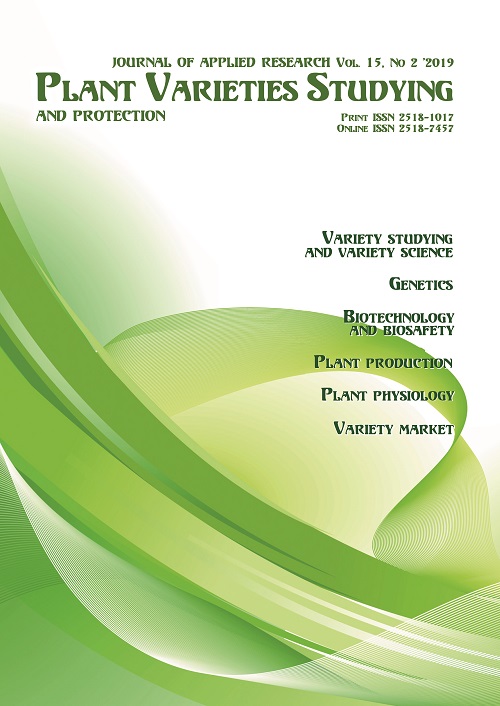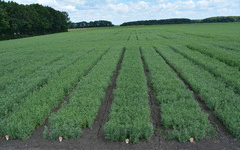Biochemical features of the introduced population of Serratula coronata L. (Asteraceae) in Central Polissia of Ukraine
DOI:
https://doi.org/10.21498/2518-1017.15.2.2019.173574Keywords:
introduction, biochemical compounds, raw, biologically active substancesAbstract
Purpose. To establish the biochemical composition of the above ground part of Serratula coronata L. (Crowned saw-wort) for introduction in Central Polissia of Ukraine.
Methods. The object of research was the plants of S. coronata from the collection of the Botanical garden of Zhytomyr National Agroecological University. Plant raw material was evaluated in the flowering phase in the biochemical laboratory of the Department of Cultural Flora of the M. M. Hryshko National Botanic Gardens of the National Academy of Sciences of Ukraine according to the relevant methods during 2014–2016.
Results. The results of the study of phytochemical features of S. coronata under conditions of introduction in the Central Polissia of Ukraine in the flowering phase are given. Quantitative content of raw material in dry matter, total sugars, carotene, ascorbic acid, tannins, fats, free acids, macroelements of phosphorus, calcium and trace elements of iron, copper, zinc, manganese was revealed.
Conclusions. The biochemical composition of the above ground part of S. coronata was determined for the first time in the conditions of introduction in Central Polissia of Ukraine. The peculiarities of the dependence of the content of biochemical compounds and macroelements on age characteristics of plants were determined. Plants of S. coronata of the third year of life were distinguished by the highest content of ascorbic acid, carotene and dry matter; two-year – organic acids, phosphorus, ash, common sugars; the fourth year of life – the content of oil and calcium. Significant amounts of vitamin C and iron were found in the raw material. The obtained results testify to the prospect of further study of the pharmacological properties of S. coronata in order to obtain new food products, bio-additives and phytopreparations enriched with biologically active substances and essential for human life.
Downloads
References
Mishurov, V. P., Zaynullin, V. G., Ruban, G. A., Savinovskaya, N. S., Punegov, V. V., & Bashlykova, L. A. (2008). Introduktsiya Serratula coronata L. na evropeyskom Suvero-Vostoke [Introduction of Serratula coronata L. in the European North-East]. Syktyvkar: N.p. [in Russian]
Chetvernia, S. O., Dzhurenko, N. I., Palamarchuk, O. P., & Hrakhov, V. P. (2015). Seed and raw-material productivity of Serratula coronata L. and Serratula tinctoria L. in natural habitats. Bìologìčnì sistemi [Biological Systems], 7(2), 222–228. [in Ukrainian]
Vasiulina, O. D. (Ed.). (1962). Flora URSR [Flora of the USSR]. (Vol. 11). Kyiv: Vyd-vo AN URSR. [in Ukrainian]
Sokolov, P. D. (Ed.). (1993). Rastitel’nye resursy SSSR: Tsvetkovye rasteniya, ikh khimicheskiy sostav, ispol’zovanie; Semeystvo Asteraceae (Compositae) [Plant resources of the USSR: Flowering plants, their chemical composition, use; Family Asteraceae (Compositae)]. St. Petersburg: Nauka. [in Russian]
Cherepanov, S. K. (1995). Sosudistye rasteniya Rossii i sopredel’nykh gosudarstv [Vascular plants of Russia and adjacent states]. St. Petersburg: Mir i sem’ya-95. [in Russian]
Sidorova, Yu. S., Selyaskin, K. E., Zorin, S. N., Vasilevskaya, L. S., Volodin, V. V., & Mazo, V. K. (2014). In vivo study of Serratula coronata L. extract on biomarkers of general adaptation syndrome. Tradicionnaâ medicina [Traditional medicine], 1, 57–62. [in Russian]
Latushkina, N. A., Ivanovskiy, A. A., & Timkina, E. Yu. (2017). Study of chemical composition and toxic properties of phytocomplex containing biologically active substances. Agrarnaâ nauka Evro-Severo-Vostoka [Agrarian Science Euro-North-East], 4, 58–62. [in Russian]
Ivashchenko, I., Ivashchenko, O., & Rakhmetov, D. (2016). Phenolic Compounds in Serratula coronata L. (Asteraceae) Introduced in Ukrainian Polissya. In Agrobiodiversity for improving nutrition, health and life quality: The Scientific Proceeding of International Network AgroBioNet (pp. 149–154). Nitra: N.p.
Angaskieva, A. S., Andreeva, V. Yu., Kalinkina, G. I., Sal’nikova, E. N., Borodysheva, E. A., & Kharina, T. G. (2003). Study of the chemical composition of Serratula coronata cultivated in Siberia. Khimiya rastitel’nogo syr’ya [Chemistry of Plant Raw Materials], 4, 47–50. [in Russian]
Myagchilov, A. V., Goncharenko, O. E., Sokolova, L. I., Gorovoy, P. G., & Dmitrenok, P. S. (2011). Extraction and identification of flavonoids from crowned saw-wort inflorescences Serratula coronata L. Izvestiâ vuzov. Prikladnaâ himiâ i biotehnologiâ [Proceedings of Universities. Applied Chemistry and Biotechnology], 1, 53–56. [in Russian]
Angaskieva, A. S. (2006). Farmakologicheskoe issledovanie serpukhi ventsenosnoy, kul’tiviruemoy v Sibiri [A pharmacological study of Serratula coronata cultivated in Siberia] (Cand. Farm. Sci. Diss.). Siberian State Medical University, Tomsk, Russia. [in Russian]
Volodin, V. V. (Ed.). (2003). Fitoekdisteroidy [Phytoecdysteroids]. St. Petersburg: Nauka. [in Russian]
Lavrenov, V. K., & Lavrenova, G. V. (2006). Sovremennaya entsiklopediya lekarstvennykh rasteniy [Modern encyclopedia of medicinal plants]. St. Petersburg: Neva. [in Russian]
Kandilarov, I. K., Zlatanova, H. I., Georgieva-Kotetarova, M. T., Kostadinova, I. I., Katsarova, M. N., Dimitrova, S. Z., Lukanov, L. K., & Sadakov, F. (2018). Antidepressant effect and recognition memory improvement of two novel plant extract combinations – antistress I and antistress II on rats subjected to a model of mild chronic stress. Folia Med (Plovdiv), 60(1), 110–116. doi: 10.1515/folmed-2017-0073
Ivashchenko, I. V. (2016). Antimicrobial activity of ethanolic extracts of Serrarula coronata L. (Asteraceae) introduced in Zhytomyr Polissya. Bìol. vìsn. Melìtop. derž. pedagog. univ. ìm. Bogdana Hmelʹnicʹkogo [Biological Bulletin of Bogdan Chmelnitskiy Melitopol State Pedagogical University], 1, 290–303. doi: 10.15421/201616
Báthori, M., Kalász, H., Csikkelné, S.A., & Mathe, I. G. (1999). [Components of Serratula species; screening for ecdysteroid and inorganic constituents of some Serratula plants]. Acta Pharm. Hung., 69(2), 72–76.
Sun, Y. G., Han, Y. Y., Woo, J. H., Seong, Y. C., Choi, K. B., & Choi, B. S. (1997). Effect of pinching and shaded treatments on flowering and growth in Serratula coronata var. insularis. RDA J. Hortic. Sci., 39(2), 80–85.
Krishchenko, V. P. (1983). Metody otsenki kachestva rastitel’noy produktsii [Methods for evaluating of quality of plant production]. Moscow: Kolos. [in Russian]
Pleshkov, B. P. (1985). Praktikum po biokhimii rasteniy [Workshop on plant biochemistry]. Moscow: Kolos. [in Russian]
Ermakov, A. I., Arasimovich, V. V., & Smirnova-Ikonnikova, M. I. (1985). Metody biokhimicheskogo issledovaniya rasteniy [The methods of biochemical investigations of plants]. Leningrad: Kolos. [in Russian]
Pochinok, Kh. N. (1976). Metody biokhimicheskogo analiza rasteniy [Methods of biochemical analysis of plants]. Kyiv: Naukova dumka. [in Russian]
Hrytsaienko, Z. M., Hrytsaienko, A. O., & Karpenko, V. P. (2003). Metody biolohichnykh ta ahrokhimichnykh doslidzhen roslyn i gruntiv [Methods of biological and agrochemical investigations of plants and soils]. Kyiv: Nichlava. [in Ukrainian]
Korma, kombikorma, kombikormovoe syr’e. Atomno-absorbtsionnyy metod opredeleniya soderzhaniya medi, svintsa, tsinka i kadmiya: GOST 30692-2000 [Fodders, mixed fodders and animal raw foodstuff. Atomic absorption method for determination of copper, lead, zinc and cadmium: Interstate standard 30692-2000]. (2002). Moscow: N.p. [in Russian]
Korma rastitel’nye. Metody opredeleniya zheleza: GOST 27998-88 [Vegetable feeds. Methods for determination of iron: Interstate standard 27998-88]. (2002). Moscow: N.p. [in Russian]
Sokolova, L. V. (2010). Determination of the quantitative content of ascorbic acid in sublimated plant powders. Ukraïnskij medičnij alʹmanah [Ukrainian Medical Almanac], 13(6), 133–136. [in Ukrainian]
Tsimbal, O. M., Matenchuk, L. Yu., & Shcherbak, N. A. (2011). Chemical and technological evaluation of fruit, representing the genus Sorbus L. Avtohtonnì ta ìntrodukovanì roslini [Autochthonous and Alien Plants], 7, 124–127. [in Ukrainian]
Varankіna, O. O. (2013). Biological action of beta-carotene: positive and negative aspects. Harčova nauka ì tehnologìâ [Food Science and Technology], 4, 46–49. [in Russian]
Myagchilov, A. V. (2014). Flavonoidy rasteniy Fagopyrum sagittatum Gilib. (grechikhi posevnoy) i serpukhi ventsenosnoy (Serratula coronata L.) (metody vydeleniya, identifikatsiya veshchestv, perspektivy ispol’zovaniya) [Flavonoids of plants Fagopyrum sagittatum Gilib. (buckwheat) and Serratula coronata L. (methods of extraction, identification of substances, prospects of application)] (Cand. Biol. Sci. Diss.). Far Eastern Federal University, Vladivostok, Russia. [in Russian]
Kukushkin, Yu. N. (1998). Chemical elements in the human body. Sorovskiy obrazovatel’nyy zhurnal [Soros Educational Journal], 5, 54–58. [in Russian]
Кotiuk, L. A. (2019). Bioloho-ekolohichni osnovy introduktsii aromatychnykh roslyn rodyny Lamiaceae Lindl. v Tsentralnomu Polissi Ukrainy [Biological and ecological foundations of aromatic plants introduction from the Lamiaceae Lindl family in Central Polissya of Ukraine] (Dr. Biol. Sci. Diss.). M. M. Hryshko National Botanical Garden, NAS of Ukraine, Kyiv, Ukraine. [in Ukrainian]
Apykhtina, O. L., Kotsuruba, A. V., & Korkach, Yu. P. (2007). Modulating effect of the Serratula coronata extract on nitric oxide exchange in aorta tissues of rats under lead intoxication. Ukr. Biochem. J., 79(5), 204–211. [in Ukrainian]
Stepanyuk, G. Ya., & Kharina, T. G. (1989). Serratula coronata as a source of obtaining biologically active substances. In Novye lekarstvennye preparaty iz rasteniy Sibiri i Dal’nego Vostoka: tezisy dokl. Vsesoyuz. konf. [New drugs from plants of Siberia and the Far East: Proc. All-Union Conf.] (Vol. 2, p. 167). Tomsk, Russia. [in Russian]
Downloads
Published
How to Cite
Issue
Section
License
Copyright (c) 2019 Ukrainian Institute for Plant Variety Examination

This work is licensed under a Creative Commons Attribution-ShareAlike 4.0 International License.
Starting in 2022, the copyright to the publication remains with the authors
Our journal abides by the CREATIVE COMMONS copyright rights and permissions for open access journals.
Authors, who are published in this journal, agree to the following conditions:
- The authors reserve the right to authorship of the work and pass the first publication right of this work to the journal under the terms of a Creative Commons Attribution License, which allows others to freely distribute the published research with the obligatory reference to the authors of the original work and the first publication of the work in this journal.
- The authors have the right to conclude separate supplement agreements that relate to non-exclusive work distribution in the form in which it has been published by the journal (for example, to upload the work to the online storage of the journal or publish it as part of a monograph), provided that the reference to the first publication of the work in this journal is included.

























 Ukrainian Institute for Plant Varieties Examination
Ukrainian Institute for Plant Varieties Examination  Селекційно-генетичний інститут
Селекційно-генетичний інститут Institute of Plant Physiology and Genetics of the National Academy of Sciences of Ukraine
Institute of Plant Physiology and Genetics of the National Academy of Sciences of Ukraine
 The National Academy of Agrarian Sciences of Ukraine
The National Academy of Agrarian Sciences of Ukraine